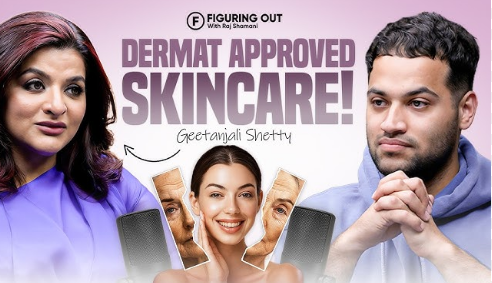
Sunscreen is often seen as an optional skincare product—something people apply only when they are heading to the beach or going on a summer vacation. But according to Mumbai-based dermatologist and trichologist Dr. Geetanjali Shetty, this approach is deeply flawed and can lead to serious long-term skin damage. Appearing on the June 17 episode of Figuring Out with Raj Shamani, Dr. Shetty stressed that skipping sunscreen is a mistake people don’t realize they’re making until it’s too late. In her words, “The earlier you realise this, the younger you are going to stay.” This powerful message highlights the importance of daily sunscreen, not just for beauty, but for long-term skin health and protection from environmental harm.
Sunscreen is not just another cosmetic product—it’s a shield that protects your skin from aging, damage, and disease. Dr. Shetty emphasized that everyone, regardless of age or gender, should make sunscreen a part of their everyday skincare routine. This article explores her expert advice on how sunscreen benefits your skin, the types of rays it protects against, the risks of neglecting it, and how to choose the right product for your skin type.
Sunscreen Isn’t Just a Summer Thing
One of the most common skincare myths is that sunscreen is only necessary in the summer. Dr. Geetanjali Shetty was clear: sunscreen should be used daily, no matter the season. Even if you’re not directly under the sun, your skin is still exposed to harmful rays that penetrate through windows, clouds, and pollution. She explained how UVA rays—a type of ultraviolet radiation—can go deep into the skin layers and lead to fine lines, sagging skin, and premature wrinkles. These rays are present throughout the year, even on cloudy or cold days.
Meanwhile, UVB rays are the ones that cause sunburn. Both types of rays damage the skin in different ways and are blocked effectively by broad-spectrum sunscreens. But that’s not all. Dr. Shetty revealed another harmful source often overlooked—blue light, also known as high-energy visible (HEV) light, emitted from phones, laptops, and television screens. Constant screen time can lead to pigmentation, dullness, and even early aging, which many people mistakenly blame on their lifestyle or genetics.
Most People in India Don’t Understand Sunscreen
During the podcast, Dr. Shetty shared a concerning observation from her medical practice. Out of every 10 patients she treats each day, 5 to 6 know very little or nothing about sunscreen, and many don’t use it at all. A common belief she hears is, “I stay indoors or work in AC; I don’t need sunscreen.” But she warned that this mindset is harmful. The sun’s rays—and now even blue light from screens—can cause skin damage even without stepping outside.
She went on to say, “Earlier, there was less pollution, and no ozone layer disruption. The sunrays are very harsh now.” With global warming, air pollution, and climate changes, our skin is now more vulnerable than ever before. That’s why it’s important to protect the skin daily, not occasionally. Sunscreen is no longer optional—it’s essential.
“Start Putting Sunscreen Indoors”
One of the most striking takeaways from Dr. Shetty’s talk was her advice to apply sunscreen even when you’re indoors. Most people assume that staying inside protects them from sun damage. But in truth, UVA rays pass through glass windows, and blue light from digital devices reaches our skin even when we sit in shaded or closed environments.
She explained that cumulative skin damage builds silently. You might not notice the effects right away, but over the years, the skin starts showing signs like dark spots, loss of elasticity, and uneven texture. The SPF (Sun Protection Factor) in sunscreen acts as a defense against this ongoing exposure. So, whether you’re at home, at the office, or driving in your car, your skin still needs protection. Dr. Shetty encourages everyone to make sunscreen a fixed part of their morning skincare ritual, just like brushing your teeth.
What Happens When You Don’t Use Sunscreen
Many people wonder why their skin is aging faster, even though they maintain a regular beauty routine. According to Dr. Shetty, the answer often lies in skipping sunscreen. Without it, your skin is vulnerable to fine lines, pigmentation, early wrinkles, sunspots, dull tone, and even severe conditions like skin cancer. The collagen and elastin in your skin begin to break down, leading to sagging and a tired look.
This kind of damage is completely preventable with consistent use of sunscreen. By not using it, you’re allowing invisible damage to build up every single day. Sunscreen acts like a protective barrier, and its benefits multiply when used over time. It’s not just about looking good today—it’s about staying youthful and healthy for decades.
How to Pick the Right Sunscreen for Your Skin Type
In a separate interview with HT Lifestyle, Dr. Akber Aimer, Director of Aesthetic Medicine and Surgery at Maya Medi Spa, provided helpful tips on choosing the right sunscreen for different skin types. Not all sunscreens work for everyone, and picking the wrong one can cause breakouts, dryness, or discomfort.
For those with oily or acne-prone skin, Dr. Aimer recommends using oil-free and non-comedogenic sunscreens. These are lightweight, often in gel or fluid form, and help reduce greasiness. If your skin is dry or sensitive, opt for moisturizing sunscreens that include calming ingredients like hyaluronic acid or aloe vera, and stay away from harsh alcohol-based sprays.
People with combination skin should go for water-based SPFs that balance oil and hydration, giving a smooth feel without making the skin sticky. It’s important to read the label, test the product on a small area, and observe how your skin reacts before using it daily.
What About the White Cast?
One common complaint about sunscreen is the white cast it leaves on the skin, especially for people with medium to dark skin tones. This usually happens with physical sunscreens that contain zinc oxide or titanium dioxide. While these ingredients are excellent for blocking UV rays and are ideal for sensitive skin, they can leave a chalky residue.
Dr. Aimer advises that if you’re concerned about appearance, choose tinted mineral sunscreens or newer formulas that are designed to blend better. Many modern brands now offer transparent or sheer SPF options that provide the same protection without affecting your skin tone.
Use Sunscreen Correctly to Get the Benefits
Sunscreen works best when it’s applied the right way. Most people don’t use enough product or forget to reapply. You should apply sunscreen 15 to 20 minutes before stepping out, and reapply every 2 to 3 hours, especially if you’re sweating or spending time outdoors. For the face, a nickel-sized amount is recommended, and for the body, about a shot glass full.
Don’t forget often-missed areas like your ears, neck, lips, and the tops of your hands. You can wear sunscreen under your makeup, and also use SPF-infused moisturizers or BB creams for additional protection. The key is consistency and reapplication, not just relying on a single layer applied once in the morning.
Make Sunscreen a Lifelong Habit
Both Dr. Shetty and Dr. Aimer strongly agree on one thing: sunscreen is the most effective anti-aging product you can buy. Whether you’re 18 or 58, adding sunscreen to your routine helps preserve collagen, prevent damage, and maintain smooth, radiant skin.
Regular use of sunscreen can delay the signs of aging, reduce the risk of skin cancer, and help your skincare products work more effectively by protecting the skin barrier. The sooner you start, the better your skin will look in the long run.
Real Results: What Regular Users Say
Many skincare enthusiasts and social media influencers swear by the power of daily sunscreen. After making it a habit, they report seeing fewer breakouts, reduced pigmentation, a more even skin tone, and a noticeable glow. The common factor? Daily use, regardless of the weather or season.
Even if it’s cloudy or raining, sunscreen remains crucial. UV rays and blue light don’t take a day off, and neither should your SPF.
Dr. Geetanjali Shetty’s interview with Raj Shamani wasn’t just a discussion—it was a wake-up call. Her message was clear and simple: Start using sunscreen now—not just during outdoor trips or sunny vacations, but every day, even indoors. The importance of daily sunscreen lies in its ability to protect, heal, and preserve your skin. It guards against UVA, UVB, and blue light damage. It prevents fine lines, age spots, and serious conditions like skin cancer. Most importantly, it helps you stay youthful, confident, and healthy.
Don’t wait until the damage is visible. Make sunscreen a permanent part of your skincare routine. Your skin will thank you for it—today, tomorrow, and for years to come.































